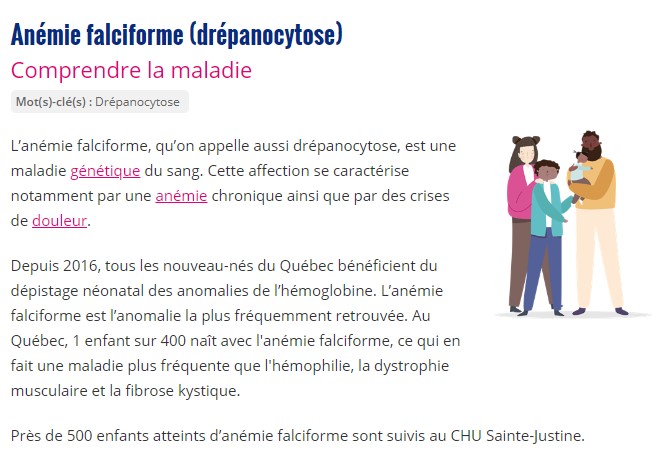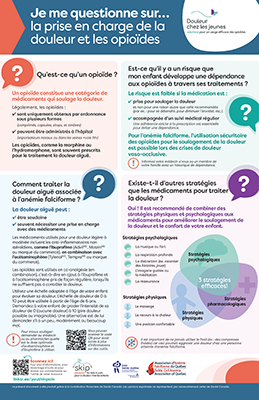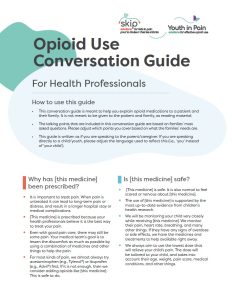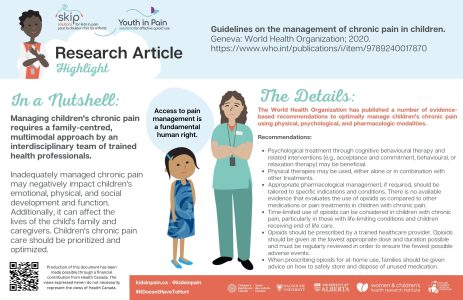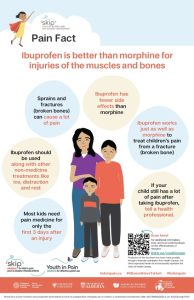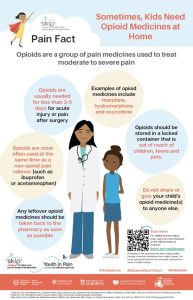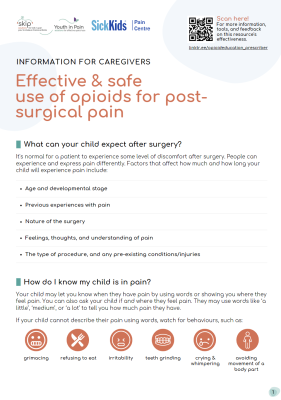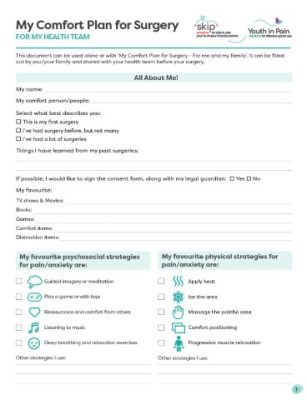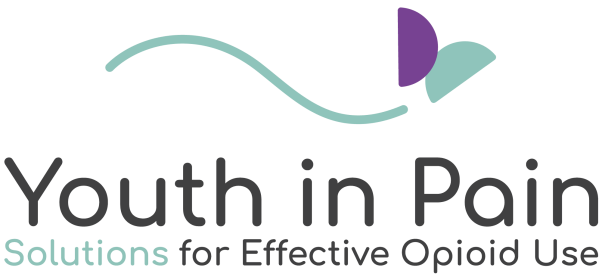

About the project
The Youth in Pain: Solutions for Effective Opioid Use project is one of SKIP’s most recent initiatives and was established in response to Health Canada’s Action Plan for Pain in Canada (2021), and guided by SKIP’s 2020 Opioids and Our Children national scoping meeting. Funded by Health Canada’s Substance Use and Addictions Program (SUAP), the project’s overall aim is to share evidence-based solutions for the medical use of opioids to address short- and long-term pain in youth.
SKIP is collaborating with a wide network of partners to drive transformative impact on this critical issue. We are developing new resources, sharing information, building capacity, and launching a narrative change campaign focused on the medical use of opioids for pain management in youth.
SKIP’s entire network is contributing to the Youth in Pain initiative, with activities and resources developed by each of SKIP’s six hubs, and supported by SKIP’s Administrative Centre.
The Youth in Pain initiative is guided by the diverse expertise of its National Advisory Group.
Tools and Resources
Children, families, and health professionals share a common goal: to prevent and treat pain as quickly and effectively as possible. Opioids should not be the first or the only option for pain management for youth; however, they can be an important tool. Canada’s first national Pediatric Pain Management standard outlines best-practice guidance on prescribing and medical use of opioids for pain in youth.
The tools and resources below were created specifically for this Youth in Pain project. More will be added as they become available.
Why This Work Is Important
“Sadly, many children and adolescents deal with acute and chronic pain every day; we need to do more to better support them and ensure a safe use of opioids for dealing with chronic pain. This is why, today, I am happy to support the organization Solutions for Kids in Pain (SKIP), housed at Dalhousie University, in their dedication to improve capacity for youth, parents, caregivers, health care professionals, and decision-makers in Nova Scotia and across Canada, and build a better health-care system that actively serves the needs of youth in the community of Halifax and elsewhere across Canada. Thanks to the Government of Canada investment through the Substance Use and Addiction Program (SUAP), together we can help improve the lives of kids in pain.”
Andy Fillmore
Member of Parliament for Halifax
“Youth in Canada experience untreated and preventable pain at times due to stigma and fear about opioid prescribing and use. Opioids can be an important part of proper pain management for youth, but currently evidence-based guidance is lacking. Solutions for Kids in Pain (SKIP), hosted at Dalhousie University and co-led by Children’s Healthcare Canada, is pleased to receive this funding to lead a nationwide initiative to improve the effective, safe, and equitable use of opioids for pain in youth in Canada. We are partnering with youth, caregivers, health professionals, decision-makers, and others to develop new resources, share information, build capacity, and launch a public awareness campaign focused on the medical use of opioids for pain management in youth.”
Katie Birnie, PhD, RPsych
Associate Scientific Director, SKIP; Adjunct Professor, Dalhousie University; Assistant Professor, University of Calgary
Christine Chambers, PhD, RPsych
Scientific Director, SKIP; Professor,
Dalhousie University
“We are committed to addressing the overdose crisis and providing people with the tools they need to effectively manage their pain. Our government is pleased to support organizations like Solutions for Kids in Pain (SKIP) for their tremendous work and dedication in providing children and kids resources and guidance, including around providing the necessary medication to manage their pain.
By supporting evidence-based initiatives like this one, we can save lives, improve capacity for health-care providers, and build a better health-care system that provides people with the fulsome and compassionate medical services and supports they need.”
The Honourable Ya’ara Saks
Minister of Mental Health and Addictions and Associate Minister of Health
Online Features

The Conversation: "Your Child Has Been Prescribed Opioids: 7 Ways To Use Them More Safely"
Dr. Samina Ali, Professor of Paediatrics and Emergency Medicine at the University of Alberta, SKIP Western Hub co-lead and YIP National Advisory Group member, here shares a high-level overview of opioid use in pediatrics, including 7 strategies for parents to help minimize their child's pain and use opioids in a safer manner... (Published April 7, 2024)

Hospital News: National efforts to guide safe, effective, and equitable use of opioids for quality pain management in children
A spotlight article in Hospital News focused on the Youth in Pain project:
"In October 2022, Solutions for Kids in Pain (SKIP), a national knowledge mobilization network promoting evidence-based solutions for children’s pain, launched “Youth in Pain: Solutions for Effective Opioid Use”. This 18-month project funded by Health Canada mobilized solutions for effective, safe, and equitable use of opioids for pain management in youth..." (Published April 2, 2024)

Canadian Dental Association (CDA) Oasis Spotlights the "Youth in Pain" project and toolkit
Dr. Astha Shah, Health Policy Advisor and Scientific Editor at the CDA and National Advisory Group member, explains to the CDA why there is a need for this project in Canada. She highlights the toolkit, which includes a section dedicated to acute dental pain...(Published March 4, 2024)

Solutions for Kids in Pain: A Knowledge Mobilization Network Built on a Foundation of Patient Partnership
This article (available in pre-print versions here) shares SKIP’s experiences with patient engagement and partnership, with specific attention to the Youth in Pain project. The article emphasizes the importance of partnering with people with lived experience throughout research and knowledge mobilization.

CHC Spark:Live Webinar
This webinar will provide an overview of Solutions for Kids in Pain’s recent Health Canada-funded initiative mobilizing evidence-based solutions for the medical use of opioids to address acute and chronic pain in youth. Including partners with lived experience, speakers involved in the project will introduce newly developed tools and resources for families and health professionals as part of the project (YouTube Video Recording, Feb 28, 2024)

HealthyDebate.ca: Why not educate the person experiencing pain? Improving opioid prescribing for youth in hospital settings
Rory is a college student who has navigated chronic pain since her early teens. In her younger days, Rory would frequently end up in the emergency department as she navigated…(Published Sep 12, 2023)

Healthing.ca Op-Ed: "It's time to make pain management for children a priority"
This National Pain Awareness Week, we must all keep children’s health, and particularly pain care, top of mind…(Published Nov 7, 2023)

Minister Bennett highlights Budget 2023 investments of $359.2 million to help address the overdose crisis and harms related to substance use across Canada
Every day, families and communities across the country lose loved ones to overdoses from the increasingly toxic illegal drug supply…
About the National Advisory Group
The National Advisory Group for the Youth in Pain project is composed of a broad range of organizational partners, health professionals, parents/caregivers, policy leaders, and individuals with lived experience in the area of pediatric pain.
The members of the Advisory Group reflect a broad range of opinions, experiences, and expertise and represent a balanced diversity of perspectives and interests on the topic.

Dr. Samina Ali, MD, FRCPC
Pediatric Emergency Physician
University of Alberta, Professor and Researcher in Children’s Pain
Advisory Group Member
Dr. Samina Ali is a pediatric emergency physician (Edmonton) and a Professor of Pediatrics and Emergency Medicine (University of Alberta)…

Natalie del Signore
Parent Partner
Advisory Group Member
Natalie del Signore is a strong parent advocate on many different boards at the regional, provincial, and national levels, with a focus on pain and genetic disorders. She is a former registered nurse who worked in both acute care and research…

Dr. Marie-Joëlle Doré-Bergeron
Pediatrician
CHU Sainte-Justine
Advisory Group Member
Marie-Joëlle Doré-Bergeron is a pediatrician working at CHU Sainte-Justine, Montréal. She works as a hospitalist and is the medical director of the multidisciplinary chronic pain clinic…

Ariana Kubelik
Patient Partner
Advisory Group Member
Ariana Kubelik is an 18-year-old with chronic pain, and is a patient advocate. She has personally experienced both the good and the bad of the current health-care system, which has pushed her to speak up and advocate for positive changes for youth in pain…

Elan Graves, RN
Senior Policy Analyst
Health Canada
Advisory Group Member
As a registered nurse, Elan Graves has had the opportunity to work with teams of dedicated professionals for more than 38 years. She has worked at the bedside, as a clinical lead and as an administrator, system planner…

Jean-François Leroux
Manager, Chronic Pain Policy Team
Health Canada
Advisory Group Ex Officio Member
Jean-François Leroux is the Manager of the Chronic Pain Policy Team at Health Canada. In his role, Jean-François oversees the coordination of the federal response to the Canadian…

Dr. Astha Shah, BDS, MSc, FRCDC
Public Health Dentist, Health Policy
Canadian Dental Association (CDA)
Advisory Group Member
Dr. Astha Shah is a Public Health Dentist employed in the capacity of Health Policy Advisor and Scientific Editor at the Canadian Dental…

Dr. Melissa Pielech, PhD
Licensed Clinical Psychologist; Assistant Professor of Psychiatry and Human Behavior
The Warren Alpert Medical School of Brown University
Advisory Group Ex Officio Member
Dr. Melissa Pielech is a Licensed Clinical Psychologist and Assistant Professor at Brown University’s Warren Alpert Medical School…

Rosalind Robertson
(Former) Director of Policy, Canadian Centre for Substance Use and Addiction (CCSA), Patient Partner
Advisory Group Member
A health-care policy expert who has advised at the most senior levels of the Ontario government. During her time on the Advisory Group, Rosalind was the Director of Policy…

Alice Watt, B.Sc. (Pharm.), R.Ph
Pharmacist, Senior Medication Safety Specialist
ISMP Canada
Advisory Group Member
Alice Watt received her BSc. (Pharm.) from the University of British Columbia. She has over 20 years of experience in community and acute care settings…

Dr. Jaris Swidrovich, BSP, PharmD, PhD(c), AAHIVP, RPh
Pharmacist, Family Member of People with Pain, Assistant Professor (Teaching Stream)
Leslie Dan Faculty of Pharmacy, University of Toronto
Advisory Group Member
Dr. Jaris Swidrovich is an Assistant Professor, Teaching Stream, in the Leslie Dan…

Ms. Lanre Tunji-Ajayi, MSM
Sickle Cell Awareness Group of Ontario
Advisory Group Member
Lanre Tunji-Ajayi is a global patient advocate committed to addressing disparities in care for hereditary blood disorders while strengthening equity, diversity, and inclusion in the global health care systems. To support these efforts…

Patient Partner
Advisory Group Member
She is a strong believer that youth experiencing pain should be taken seriously and be informed about their own care. Opioid prescription for pain in youth can be an effective tool for pain management. She feels strongly that resources…

Dr. Naiyi Sun, MD
Physician
The Hospital for Sick Children
Advisory Group Member
Dr. Sun is a pediatric anesthesiologist and chronic pain physician at The Hospital for Sick Children and an assistant professor at the University of Toronto. Her clinical focus is on the management of chronic pain in children and adolescents…
This initiative was funded by a contribution from Health Canada’s Substance Use and Addictions Program (SUAP). The views expressed herein do not necessarily represent the views of Health Canada.
The objectives of this Youth in Pain project have been achieved thanks to the collective efforts of individuals representing the organizations and institutions below, and more.








